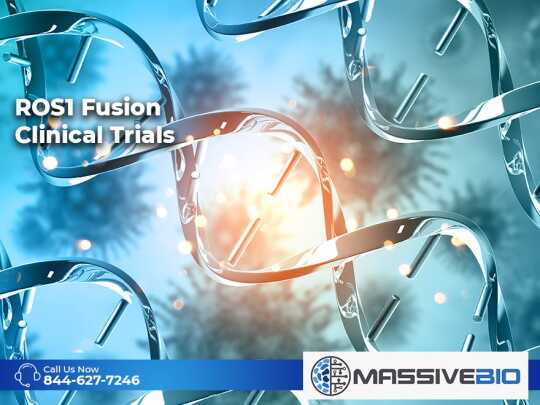ROS1 fusion clinical trials research targeted treatments for ROS1, the tyrosine receptor kinase responsible for creating the protein ROS1 gene. ROS1 is responsible for cell growth and signaling. Mutations of the ROS1 gene are present in several cancer types. However, this gene also can form fusion genes, when two independent genes join, after DNA from one chromosome moves to another. These fusion genes can also lead to the development of cancer.
Some cancers with fusion genes present are difficult to treat because the gene mutation may be immune to standard treatments. Researchers are developing drugs in clinical trials that target the fusion genes and prevent them from continuing to produce cells. In most cancer cases, ROS1 fusions are seen in non-small cell lung cancer (NSCLC), but it has also been identified in:
- Lymphoma
- Colorectal cancer
- Stomach cancer
- Ovarian cancer
- Glioblastoma
What Are ROS1 Fusion Clinical Trials?
There are 43 total ROS1 fusion clinical trials currently available, most of which are for NSCLC, as it was the first cancer type identified with the fusion gene. 1% of all lung cancer cases have the ROS1 gene mutation. Clinical trials research new approaches to treatments in hopes they are more effective than the standard treatment currently used. Before being approved, these therapies must prove effective and ensure long-term safety for the patients.
There are 4 total phases of cancer clinical trials. After the 3rd phase, the FDA approves the drug, while continuing to ensure its safety in phase IV. The entire process can take several years, meaning clinical trials provide early access to the therapies and drugs being researched. The trials by stage are listed as follows:
- 7 phase I trials
- 5 phase I/phase II trials
- 30 phase II trials
- 1 phase II/phase III trials
Targeted therapies are more effective for cancer with ROS1 fusions present because they can locate mutated proteins and stop them from growing, dividing, and producing more cancerous cells. Common drugs for NSCLC clinical trials targeting ROS1 fusions include:
- Crizotinib (Xalkori)
- Entectinib
- Lorlatinib
- Ceritinib
- Dacomitinib
- Gefitinib
- Pembrolizumab
Targeted therapies for other cancer types including lymphoma and colorectal cancer are also available for patients to enroll. Every patient is different, so it is important to talk to your doctor to see if a clinical trial might benefit you.
Sources:

